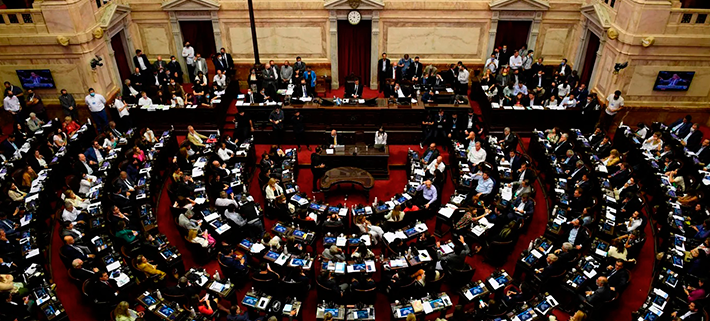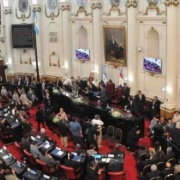The National Congress must treat DNU 70/2023 urgently and reject it for violating the National Constitution
Civil society organizations write a letter to legislators asking them to focus on the immediate treatment and rejection of the decree “Bases for the Reconstruction of the Argentine Economy.”
“Below, we offer a google translate version of the original article in Spanish. This translation may not be accurate but serves as a general presentation of the article. For more accurate information, please switch to the Spanish version of the website. In addition, feel free to directly contact in English the person mentioned at the bottom of this article with regards to this topic”.
In accordance with what is established by the National Constitution, the Executive Branch is prohibited from issuing legislative provisions. However, our fundamental rule allows that exceptionally, and in accordance with certain requirements, the tool of decrees of necessity and urgency (DNU) be used.
These types of decrees are admissible only when there are exceptional circumstances that make it impossible to follow the ordinary procedures provided for the sanction of the laws. That is, the DNUs proceed when the situation is of such urgency that it must be resolved immediately, within a period incompatible with that required by the normal parliamentary procedure.
It is evident that the foundations of Decree 70/2023 do not meet the requirements for the issuance of a standard of this nature. There are no sufficient arguments to explain the circumstances of force majeure that prevent the chambers of Congress from meeting, nor is it proven that the solution required is incompatible with the legislative debate. In fact, before the decree came into force, the Executive Branch called extraordinary sessions, and today Congress is in session. Furthermore, the causal relationship between the identified problems and the measures available is not explained.
Far from understanding the nature of the tool, DNU 70/2023 carries out a massive and systemic legislative reform. Given its magnitude and significance, the regulatory changes included in it can only be discussed by Congress, which is where all political forces are represented, including minority ones. Additionally, it is the legislative debate that provides opportunities for citizen participation, essential for strengthening the democratic system. In this sense, it must be remembered that, as our Supreme Court of Justice pointed out, “the National Constitution does not allow a discretionary choice between the sanction of a law or the more rapid imposition of certain material contents by means of a decree”.
On the other hand, it is essential to highlight that Decree 70/2023 is already in force, projecting itself on substantive aspects of our community life, addressing issues related to health, housing, labor relations, contracts, economy and finance, among others. These modifications affect the individual and collective rights of millions of people, many of whom are already before the courts demanding their suspension and inapplicability for themselves or for the groups they represent.
It is precisely to avoid excesses in the use of the power to issue decrees of necessity and urgency that our Constitution designed a subsequent legislative control process through which its validity or invalidity is determined taking into account the adequacy of these to the established formal and substantial requirements. constitutionally for its dictation.
Having expired the deadlines established in Law 26,122 for the opinion of the Permanent Bicameral Commission, Congress has the duty to rule on the decree. For this reason, we ask the legislators of both chambers of the National Congress to dedicate themselves to its express and immediate treatment, and reject it for not satisfying the constitutional requirements.
The silence, the wait, the calculations associated with political gain imply an implicit endorsement of a conduct that ostensibly goes beyond the contours of our fundamental norm. In defense of the Constitution, the system of checks and balances, justice and legal security, Congress is called to ensure that the Executive Branch operates within the limits of the rule of law. The duty to our National Constitution and to citizens must prevail over any other consideration.
Organizations:
- Asociación Civil por la Igualdad y la Justicia (ACIJ)
- Amnistía Internacional Argentina
- Equipo Latinoamericano de Justicia y Género
- Fundeps
- Centro de Estudios Legales y Sociales (CELS)
- Fundación Ambiente y Recursos Naturales (FARN)
- Jóvenes por el Clima
- Hora de Obrar
- Instituto Latinoamericano de Seguridad y Democracia
- Asociación Civil para la promoción y Protección de los Derechos Humanos (Xumek)
- Abogados y Abogadas del NOA en Derechos Humanos y Estudios Sociales (ANDHES)
- Instituto de Estudios Comparados en Ciencias Penales y Sociales (INECIP)
- Centro para la Implementación de los Derechos Constitucionales (CIDC)
- Democracia en Red
- Centro de Políticas Públicas para el Socialismo (CEPPAS)









